#this is the part where we should be sympathizing with ADORA
Explore tagged Tumblr posts
Text
so i found this on pinterest and..

correct me if i'm wrong but isn't this the part where shadow weaver tells adora that she has to take the failsafe and risk getting killed to save etheria? why in the world would catra be jealous of that??
#why do stans keep turning everything into catra angst?#this is the part where we should be sympathizing with ADORA#for once#but they still find a way to make it all about catra#spop critical#spop salt#spop criticism#spop discourse#spop#she ra#anti spop#anti stans
63 notes
·
View notes
Text
I get why people do it, especially after decades of queerbaiting. If you’ve spent a lot of time being made to feel stupid by creators for picking up on romantic tension between characters, and those creators insist that you’re crazy for thinking that because they’re “just friends”, I can see how it’s cathartic to deem that there is no other explanation besides a romantic one.
But just because I understand and sympathize with WHY people say this doesn’t mean I think it’s accurate. I’ve often told people about how when I watched the new She Ra reboot back in 2020, I didn’t think the scene in season 1 where Adora and Catra were dancing at the princess prom was romantic. In fact, I read it as pretty antagonistic, given how the whole thing was essentially Adora trying to figure out what horrible thing Catra must be planning, while Catra egged her on. It was only when I went online that I realized that people pretty much pointed to it as the prime example of queerness in the show (at least before there was an on-screen Catradora kiss)
And I’ve been bringing that up with people to make fun of myself like, “oh I’m so dense that I watched an *obviously* romantic scene and didn’t think it was romantic”, but now that I think about it, I don’t think I was wrong. I think my reading was perfectly valid, and if I was up for it, I think I could defend my interpretation pretty well. But I don’t think the Catradora truthers were wrong either, and I think they could also defend their interpretation pretty well (in fact they have, I’ve found dozens of videos and articles and tumblr posts about it and they all seem to hold up)
I just thought this was worth bringing up because it’s part of why I’m so frustrated with the “why can’t we just have close male friendships without it being romantic” crowd. Because I agree with that statement, I think we should have more depictions of people being devoted to their platonic friends in a way that is platonic, and I’d love to see more media where platonic attraction isn’t treated as being “lesser” than romantic attraction. And it would be cool if those depictions included friendships between men, where that vulnerability and devotion existed without it being considered a sign of weakness. But in my experience, most of the people talking about the importance of make friendships aren’t saying that because they care about all that stuff I just said, they’re saying that because they hate gay people and don’t want anyone to call their blorbos gay.
This was longer than I expected, I probably should have just said “media can be interpreted in a lot of different ways and the only ‘wrong’ way to enjoy said media is to shit on other people for enjoying it in a different way”.
Shipping is fun and all but I swear every single time someone makes a comment, whether as a joke or in a legitimate analysis, about there being "no other explanation" for a pair's interactions, I lose just a bit more of my sanity
Like, no, you guys don't get it. Romance is not about the Amount of devotion, it's about the COLOR. the FLAVOR of it all. a character can be just as devoted to their platonic friend as they are to their romantic partner, and they don't love either of them more, just differently.
But because the majority of people still have it stuck in their minds that romance exists on the highest tier of love, I'm stuck seeing endless takes that boil down to "these two care about each other too much for it to NOT be romantic" as if that's the core determining factor to how literally any of this works
In conclusion: stop telling me that I don't understand the story if I don't interpret the leads as romantic, I am TIRED
25K notes
·
View notes
Text
TL/DR - Catra is a uniquely complex and compelling character who has -so much going on- compared with most characters in any medium. Her character arc is psychologically astute, morally powerful and dramatically compelling, and it pushes the boundaries of the audiences sympathies in ways that are really groundbreaking for a kids show, and her arcs conclusion celebrates love, growth, and the power to change in a way that is all too rare in TV for grown ups.
Content note for mentions of suicidal ideation and self harm.
Well, now that the summary is out of the way, here’s a massive fucking dissertation on why Catra is such a great character.
This is the first of a series of posts outlining things that make She Ra a truly great show, one that stands out even 15 years into a golden age of TV animation for kids. This isn’t going to be a comprehensive account for why the show is great - the real answer is that this show has so many arcs and so many fully realized characters and they are all growing and changing in ways that interact with each other and complement each other so well. But I’m going to highlight some particular standouts, things that this show does better than anything else, things that made me step back and say ‘holy shit they did this in a show pitched at 10 year olds?!’
And so the first of these posts is about Catra. I’ve never seen a character in a kids TV show like Catra before. Depending on the season, she’s an anti-villain, an outright villain and an anti-hero and then, in the end, a hero. Being glib, I describe her in villain mode as a Saturday morning cartoon Supervillain as written by like, Dostoevsky. She’s got the trappings of classic villain camp - long speeches, sneering, over-complicated plans, she’s oddly ineffectual at times etc/ Yet all of this is underlaid and justified by something much deeper - her feelings of rejection, her desire to lash out at everyone around her, at her self-hatred and hatred of everyone and everything else (at least by Season 4. Good God.) And her actions are as dark as her motivations - she nearly destroys reality out of spite, betrays literally everyone who cares about her (often multiple times) and isolates herself so completely that in the season 4 finale she is a solitary, suicidal wreck of a person. Hell, in her last fight with Hordak, I was definitely rooting for Hordak (to say nothing of Glimmer, who is a pretty impressive antiheroine, like if Sparkles had just blasted her into glittery oblivion would we have held it against her?).
Let's start by discussing trauma. It comes up a lot with Catra for obvious and good reasons. But I almost feel like that word is insufficient for what's going on with Catra, or at least, we shouldn't stop with it (I know there are terms like complex trauma, but rather than simply using those I want to explain the difference between Catra’s consistent abuse and a single traumatic event). To use another example from a different show, Korra was also traumatized in season 4. But she was traumatized by a series of an events when she was a young adult. She had something horrible happen to her, and it fucked her up, and then she had exposure therapy with Zaheer and at least starts to get better. Catra...Catra is much more consistently abused. It's not just that shadow weaver traumatized her with the various acts of torture, but that Shadow Weaver taught Catra both an explicit worldview and a series of coping mechanisms that she struggles with through young adulthood. First, Shadow Weaver trained Catra to seek her approval. This is something she is particularly vulnerable to with Shadow Weaver, but also what she does with Hordak and to a extent Double Trouble. Catra's instinct when people mistreat her or show that they aren't trustworthy is to invest further in the relationship, until the breaking point. By contrast, when people treat her well Catra lashes out or takes them for granted. This is uh…a dymamic I am acquainted with among people who have been abused as kids, people whom I love. It is pretty rough.
She also developed a desire to prove herself. This starts off being tied to her drive for approval, but combined with her competitive streak (which is expressed in both healthy and unhealthy ways with Adora) it turns into a desire to beat Shadow Weaver and then Hordak at their own game.
At the same time, Catra learned by always being blamed for everything to evade and deny responsibility, no matter what. I think this form of self reassurance is tied to her self doubt (I think at some level she does think she is worthless) and her self hatred. It is also enabled by Adora’s martyr complex and willingness even act as Catra’s punching bag (as we see in the flashback in Corridors). This is a dynamic that actually repeats in an even worse fashion with Scorpia. Far from being arrogant, her constant evasions, put downs against others and preening speeches sound like the words of a woman who is trying to convince herself most of all. This tendency borders on narcissistic self delusion by season 3-4, which she begins recounting her version of events and possibly believing it even when it is obviously false, and everyone knows it.
When it comes to worldviews, Shadow Weaver taught Catra that love is about control and manipulation. We see this in seasons 1-3 where she congratulates herself for manipulating Adora when all she has done is take advantage of Adora's lingering love for her. Meanwhile, she’s learned that power is her only protection, and that the only way to stay on top is to abuse those beneath her.
The final kind of static tendency in Catra is her identity in the horde and her view of herself as one of the bad guys. This is something she rarely articulates but underlies much of her her decision to stay and not join Adora (at least at first). I think one thing to consider is that even if Catra never believed horde propaganda, it may have made her cynical and unwilling to imagine something better for herself or the world. Another factor is having struggled to belong in the horde for so long, she isn't going to give up now. At first this ties into her desire to win the approval of shadow weaver and Hordak, then it comes from her desire to prove herself better than them. Another factor is her self hatred. She sees herself as someone who hurts people, perhaps as a monster. She sees herself as a bad guy and so team evil is her side.
So yeah, our girl is kinda fucked up.
And yet Catra is never reduced to the sum of her traumas and bad habits. At every step of the way she is shown as a moral agent. She is shaped by shadow Weaver's abuse but she remains aware of and responsible for her actions. This is a double edged sword. She is fully responsible for her actions, but also she is never shown as broken by abuse or mental illness. She’s fully responsible, but by the same token is also redeemable, because she still has a choice.
So with that our of the way, let's go to Catra's arc.
I’m not going to recite everything terrible Catra does because I’m still on my first complete rewatch and I honestly find it hard to list it all. It’s a lot. So let’s talk about her shifting motivations. Early on, we see her desire for approval and recognition motivating her in ways that are so easy to sympathize with - she’s been told she’s worthless for years, and she wants to be worth something. We see how much she’s been scarred by Shadow Weavers abuse and by the ruthlessness and callousness of the Horde, and can sympathize with her desire to survive and advance since her own position is so untenable. We also see how, at first, she wants to be reunited with Adora. Her first huge turn into much darker territory is Promises, when she tries to kill Adora in order to permanently sever her connection with her own life and eliminate a possible rival for advancement (should Adora ever return). She’s told herself that she doesn’t want Adora back, and at least partly means it. Yet we still show her care for Scorpia and Entrapta and even Shadow Weaver in Season 2. It’s when Catra realizes that Shadow Weaver has chosen Adora over her once again that she takes her darkest turn. It’s not just that she destroys reality out of spite, it’s that she rejects her chance for a better and happier life, betrays every friend she has and focuses single-mindedly on hurting Adora (and arguably herself) and then on surviving when her attempt fails. Then Catra spends an entire season both fully inhabiting her role as a villain (and not a sympathetic one - really only our history with her leaves us sympathetic) and being utterly self-destructive and miserable. At the end, as mentioned, she’s a broken, suicidal wreck who has destroyed everything she’s strived for. If this was an HBO drama, we’d roll credits here and she’d go down as another self-destructive antihero. It would perhaps be too much to call her ‘Walter White as a catgirl’, but still. Of course, her story doesn’t end there.
Something that is incredibly dark that is happening in step with this is Catra’s hardening of herself, indeed, her dehumanization of herself. We see her struggle with her natural compassion, her kindness, her need for connection, her desire for happiness, and we see her ignore it all, stamp it down and nearly snuff it out. This is a huge factor in her descent into becoming a real villain (no ‘anti’ qualifiers needed). Every step of her descent is a struggle for Catra - not going with Adora in the second part of ‘The Sword’, trying to kill Adora in ‘Promise’, going back to the Horde, betraying Entrapta, lying about Entrapta, threatening Scorpia, destroying the world - but she always chooses evil. And with every step she becomes more isolated, more callous, and more cruel. Her default reaction becomes not just bravado and mockery and insolence, but threats, bullying and intimidation, until her management style is identical to Hordak’s, and indeed, is quite a bit worse. Catra starts off fighting for Hordak and Shadow Weaver’s approval and struggling to survive, and ends up cackling maniacally at her brutal and murderous conquests. She has very deliberately turned herself into a cruel conqueror, and a tyrant. This self-dehumanization is a huge part of evil in the world, I think, and it’s really powerful to see it so clearly in a kids show.
Meanwhile her insistence on evading all responsibility finally results in a self-serving, self-protective narrative that insulates her from responsibility or self-examination but also cuts her off from reality and other people. It’s always a bit unclear to what extent her various untruths (about Adora leaving her, about Shadow Weaver’s escape and her concealment of it not being her fault, about Entrapta betraying Hordak) are things she believes, lies she is telling to have power over others (mostly Scorpia) or things that she doesn’t quite believe but is trying to convince herself of. It’s probably all of these at various times, and in different degrees for each lie. The end result is that Catra is even more alone, because only she inhabits the safe cocoon of lies she’s built around herself. It also is the key to her and the Horde’s downfall - Catra is so isolated and in such denial that she can’t see how thin her forces are spread, and this crack shows up even in episode 1 of Season 4, with her insistence that the Princess Alliance is in shambles (when, in fact, it’s already rebounding, and proves more resilient than she allows herself to believe, and is led by a woman as ruthless and determined as herself). This part of Catra’s arc brilliantly shows how deception (of yourself and others) can feel protective by keeping shame at bay, but ultimately is destructive and strips someone of so much of the intellectual and moral qualities that we call ‘human.’ It’s also chilling to see since we’ve seen the end game of this mentality play out in US national politics, at the highest level.
I said at the opening that we’ve never seen a sympathetic character like Catra in a kids show. What about Zuko? I would argue that Zuko is never a cruel, or as callous, or as self-destructive as Catra is at her worst. Zuko is motivated by a desire for recognition from his abusive father (much like Catra is initially motivated by desire for recognition from Hordak and Shadow Weaver, and indeed Adora), and perhaps a desire to belong in the Fire Nation. All of this gets wrapped together in his ‘Honor’. He’s a young man with a very weak sense of what he truly believes, instead relying on external guides to what he should do. He’s also incredibly self-involved, and initially indifferent to anyone’s pain but his own and anyone’s needs but his own need to restore his honor. Uncle Iroh is there throughout to push Zuko both to see the needs of others and to become his own person. Zuko’s redemption arc, then, is a twofold quest to recognize other people and to find his own moral center and act from it. This is a pretty powerful coming of age story in that it is about him becoming his own person and throwing off the shackles of his upbringing. Politically, it’s a powerful story of a young man taking responsibility for his own actions in an authoritarian regime and refusing to participate in its imperialism any more and to embrace a new way forward both for himself and his nation. At the same time, in some ways it is easy to sympathize with Zuko because his greatest crimes are those of weakness - he’s not strong enough to stand up to his nation and his family until midway through the last season. Catra though...Catra does what she does, eventually, because she wants to hurt people. She’s cruel, and spiteful, and destructive in ways that are truly scary and which prevent any excuse or mitigation.
Which brings up the other comparison - Azula. But while Azula is (somewhat inconsistently) shown either as a monstrous child sociopath or a traumatized and broken child who can’t help it (and thus, perversely, as not a moral agent but something like a monster), Catra is consistently shown as a moral agent. Catra chooses her own path, every step of the way. She has so many chances to do something else - Adora’s offers to leave together in the two-part series opener, Promises, Scorpia’s suggestion that they dessert the Horde and become desert gang leaders, etc - and until season 5, she turns them all down. While Azula seems destined for evil and madness, with Catra we see a young woman very deliberately walk down the path into unmitigated evil with both eyes open. And then we see it destroy her.
And after she is basically destroyed, we see her build herself back. This process actually starts in Season 4 with the creeping realization that even when she is winning she is miserable and alone. She doesn’t even notice Scorpia is gone for several episodes, then she completely loses it. She spends the entire time when she is at her most triumphant isolated and raging and borderline incoherent, as ineffectual as she accuses Hordak of being. She’s won, and she’s alone, and she’s the most unhappy she has ever been, and I think for the first time she realizes that. And that’s the worst blow to her, even before all the external things come crashing down. She’s already miserable before Double Trouble and Glimmer deal her a triple coup de grace of destroying all her armies*, turning her and Hordak against each other and then Double Trouble’s epic evisceration. By the time Glimmer shows up, Catra is, as mentioned, literally suicidal. But she’s also already begun the process of changing in that she knows that she has a problem (her, and her self/other-destructive tendencies). Moreover, she knows, at some level, that what she really wants isn’t conquest, or to prove herself as the baddest leader of the Horde, but love - and she’s seen how she’s squandered that at every opportunity.
Let’s just pause for a moment to observe how much better Glimmer is at villainous machinations than Catra. In a couple episodes she makes a faustian bargain for unlimited power, kills all her enemies armies, sets her two chief foes at each other’s throats and literally cripples one while rendering the other helpless. And given her ironic non-answer about hurting Catra (‘we’re the good guys, remember?’ and the fact that she’d tried to kill Catra twice before**, she walked into Hordak’s sanctum fully intending to end Catra’s life, one way or another. She does all this through ruthlessness, recklessness and treachery, and she could give like, a TED talk on villainy. Of course it also blows up in her face and is actually way worse than the portal did in Catra’s, endangering the whole universe (I always assumed that the portal only threatened Despondos), dooming Etheria to invasion and all that. Of course, Catra pulled that switch and then fought Adora knowing that the world was ending, while Glimmer was just ignoring warnings from...just about everyone, including Shadow Weaver. So yeah, Glimmer, best kids show antihero since Princess Bubblegum***(unless we’re counting Catra as an antihero, which works for the first half of season 5).
Anyway, at the beginning of Season 5 Catra is adrift. Though some interpretations, like TV tropes, see her as immediately falling back into old habits and casting her lot in with Prime, I see her actions from the end of Season 4 onwards as more ambivalent. She seems to be kind of...going through the motions. She doesn’t have any of the drive or passion in her plotting that she once did, she seems to be maneuvering into Prime’s good graces out of habit. At best she’s back in the survival mode of early season 1, but without the ambition and desire to prove herself that motivated her. Some interpretations put a lot of stock in Prime being someone that can’t be bargained with or appeased, but...I don’t buy it. I take him, to an extent, at his word when he says that he was ‘exalt’ Catra (I am sure it is something awful). Catra actually gets what she wants halfway through “Corridors.” Only it’s not what she wants. She’s done jockeying for advantage, especially in a world where she truly would be alone because all she has is this psychopathic narcissist and his clones for company. She wants connection. She wants to do what is right. She’s suppressed all her humanity (felinitity? Anyway) for years and it’s made her miserable, and now she’s ready to embrace it. At the same time she confronts her own culpability, seeing just how much harm she’s done and admitting it for the first time. Her first lifeline is Glimmer, the only person she can actually talk to, the only other Etherian, the woman whose mother she doomed and who has nearly killed her three times. But Glimmer is also going through her own dark night of the soul - Glimmer and Catra’s character arcs were converging at the same time that Catra’s and Adoras and Glimmer’s and Adora’s were diverging. And they come together on either side of that forcefield, just talking and being people in an environment that is designed to be as dehumanizing as possible. Even this barest lifeline is enough for Catra to hold on to for dear life, and enough to inspire her to not just feel bad about the bad things she’s done, but do something good.
But the first way she does this is a cop out. Her plan, like Shadow Weaver’s in the finale, is to sacrifice/kill herself doing ‘one good thing.’ That way she doesn’t have to figure out how to live with the consequences of her actions, face the possible rejection of the people she loves whom she’s wronged, and do the hard work of building herself back up as a better person. She gets to die a hero rather than live as a villain. That said, unlike Shadow Weaver she does at least get off one apology, and it makes all the difference.
Then Adora fucks Catra’s sacrifice up, in glorious, space operatic, gay AF pulp fiction fashion, by saving the cat. Catra is mind controlled or unconscious for most of this episode, but what she does do is so crucial. When Adora comes for her, she reaches out to her, as soon as she is able. She doesn’t push her away, she takes Adora’s help, and her love, and Adora does the rest in badass fashion. The next few episodes plus the so perfect its canon Don’t Go are my favorite part of Catra’s entire arc.
She nearly falls back into her old habits, at least partly. Now that she has to live with what she’s done rather than just dying for it she just wants to run away again. But when she has to choose between losing Adora all over again and confronting herself and her past, she chooses Adora, and asks her to stay.
Catra then spends the rest of Season 5 slowly easing herself into the very human world of the Princess Alliance - the comaradery, the dedication to others and a cause, the goofiness. I’m going to talk a lot more about her relationship with Adora in my Catradora post, but I do want to highlight three moments.
The first is Catra running away again. This is actually a big change from what she’s done before - she’s not leaving because she’s angry, or bitter, or spiteful, she’s leaving because she doesn’t want to see the woman she loves sacrifice herself yet again (maybe this time for good) after being manipulated by the woman who had abused them both. But then she comes back. And then she confronts her abuser in a way that she has never done before - for the first time in the series, she not only calls Shadow Weaver out but calls her to do the right thing, and doesn’t give up until she does (this is after Adora also calls SW out and cuts her off forever, meaning that her two charges have finally called her on her bullshit and chosen each other over her, more in my Shadow Weaver Rant...and I guess my Catradora rant).
Then, at the end, Catra both stays with Adora through her potentially fatal harnessing of the Heart of Etheria and then her comes in and rescues her by challenging her to do something for Catra and for herself. Not to be with Catra, or to kiss her, or love her, but just stay for her. Needless to say, Adora responds far more enthusiastically than Catra had dared hope. (more on this in my Catradora rant).
Catra starts the show convinced she doesn’t need anyone except Adora, and she’s willing to even push Adora away if she can’t have Adora on her own terms. She goes down that path - ambition, manipulation, treachery, cruelty and isolation - until she has nothing left. She then slowly, painfully, turns around and reaches out and begins to heal the pain in Etheria and the universe rather than causing more. This is a psychological journey in many ways, but even more than that it is a profoundly moral one. It is a story of her accepting responsibility for her actions, facing reality, reaching out to others and making amends. It is in every sense a redemption. And while it works perfectly with Adora’s own development into her own, fuller, happier, healthier person, it works not because of Adora or the power of love, but because of Catra herself. Adora’s companionship, Adora’s rescuing of her and holding her to account, all of these are necessary for Catra to change for the better. But in the end it is Catra herself who chooses the right path, maybe for the first time in her life. And that’s what makes the romance work in turn - Catra is motivated to change not simply by a desire to impress her girlfriend or by Adora’s shining goodness (to the contrary, Adora’s a healthier and less self-sacrificing person at least in the finale...she comes around later than Catra) but by her desire to be true to herself and seek out what she really needs and wants - which is love, and connection, and to do good rather than evil. It’s a gorgeous story that takes an antihero all the way down to hell and then back again, and this makes it a truly unique redemption arc in all of kids TV - not just because of how far Catra falls, but how far she travels overall.
*(I know a lot of fanficcers talk about there being a lot of Horde Soldiers left but like...in the show...they’re nearly all dead, guys. Glimmer and company...okay mostly Mermista... just about killed them all in an afternoon. The cadet Triad survives because they deserted and weren’t there to get drowned/frozen/suffocated by plants when the grand invasion of Brightmoon went sideways)
**Okay, once she was only an accessory to Shadow Weaver’s attempted murder of Catra, the other time she leaves Catra for dead in ‘Pulse’
***I stan PB so hard guys. So hard. Machiavellian genius, mad scientist, god figure, possible Nietzschean Ubermensch? She’s so great. So great.
47 notes
·
View notes
Note
I’d love to get some commentary on the scene in Demons where Catra finally decides to say fuck it and leave the Horde? Or, if it is answered already, maybe the scene in chapter 31 where Catra is struggling with the narratives of being a villain and a victim? Because those scenes came for me while reading. In different ways, of course.
Sure thing! The first was already requested so I’ll take the second. I’ll leave out the part right at the end because that’s after the reminiscing on this theme in particular is over and the content is pretty triggering. (Commentary is bolded.)
You know, it’s funny. This wasn’t initially a theme I was planning to specifically focus on in the chapter even though it was always there in the background. But I was going through a really rough couple weeks mental health wise when I finished this chapter and the kinds of things that were going on in my head ended up making it onto the page.
I’m someone who had a very rough childhood for a plethora of reasons and has always felt the world was out to get me, but at the same time I’m not blameless either. As much as I’ve always tried to be a good person, there were times when I wasn’t, and it’s easy for me to look back at what I went through and wonder a) how much of it was due to me accidentally being selfish or alienating people and b) if maybe I ended up deserving it in the end based on who I became later. And I think that’s a mental trap a lot of abuse survivors fall into... they were hurt and end up lashing out to express themselves or because they can���t hold it in anymore, or they just don’t know how to have functional relationships and end up being toxic to other people, and then start to think “oh they were right about me, I’m a terrible person who’s undeserving of love.”
That mental battle really fit well with what was going on with Catra, because she’s been plagued with these nightmares that remind her of all the ways she was hurt but also carry all these terrible messages about her lacking worth and agency. Compound that with Lonnie showing up and not letting her act like she was only a victim (which is true) and her guilt over the way people are still afraid of her and in general over being a recovering villain, and then of course the way she reacted to Adora’s confession earlier in the chapter, it was this big mess with these two narratives of her own life being in conflict. Even the Octavia flashback lined up incredibly well with that idea once I took Baby Catra’s thoughts the direction I did. So yeah, that’s how this whole bit was born.
The longer she punches, the sicker she feels. She hates Shadow Weaver, and she hates her life. The memory won’t stop playing in her head. Remembering that pain, that helplessness, it makes her feel like a tiny bug being crushed under the heel of a cruel fate. A lowly creature destined only to suffer and then get stamped out on a whim, her remains dragged across rough concrete until they disintegrate, leaving nothing but an ugly stain to be washed away.
That imagery is beautiful and I might have cried a lot while writing it. It’s just... something I feel.
But that’s just her victim complex talking, isn’t it?
Big ouch. I owe this line to the retooled opening scene which @malachi-walker helped me build. I did write Lonnie’s line about this myself, but credit where credit is due, she gave me ideas to make the chapter better and it was so much better and coherent theme-wise after that.
No, Catra’s no victim. She’s a straight up villain. That overwhelming hatred eating her from the inside, it’s for herself as much as Shadow Weaver. What kind of monster behaves the way she did back in Adora’s room?
Okay to be fair Catra was not totally in the wrong there, it’s a complicated situation, but she’s spiralling so she’s not exactly a reliable narrator here. (Adora similarly ends up thinking she was the one at fault, so there you go.)
In her defense, she was caught off guard. Catra already understood, after much discussion, that the relationship between Adora and their guardian was not as rosy as it had appeared to her all those years. But that knowledge did nothing to prepare her. The thought of Shadow Weaver hurting Adora, hurting that anxious, loving, vulnerable child, it made her want to scream. (You and me both, Catra.) To hug Adora and tell her she didn’t deserve it, never could have possibly deserved that. But did she? No. Adora told Catra something horrifying and she couldn’t even sympathize, too caught up in her own rage and jealousy to show concern for someone she supposedly cares about. But what else is new?
Really, what else is new?
Maybe she had a point, maybe Adora was wrong to equate their experiences. Maybe Adora was never trying to, and it just felt that way. Catra’s not in the right headspace to evaluate that right now. But either way, it didn’t justify that kind of reaction. It’s like those incidents in her childhood with Octavia, with Lonnie and Adora. Standing up for herself and expressing her feelings shouldn’t mean having to attack, to brutalize her prey. But a beast knows no different.
I hate (love) when we can just see the way Shadow Weaver has shaped her thinking and is still hurting her even from beyond the grave.
Lonnie was right, Catra’s just like Shadow Weaver. She’s trying to be better than her, swore to her that she would be, but she isn't. She never will be. Shadow Weaver crafted Catra in her own image, cut away the good parts of her and molded what remained into something sharp and ugly, forged it in fire until it was as hard and unforgiving as her. (Another load of imagery I relate to and cried a lot at.) Even if she wasn’t a monster to begin with, that witch poisoned her and turned her into one. And there is no antidote, not for this affliction.
She should never have dragged the squad out here, convinced Adora to leave the safety of the Crystal Castle, let Scorpia and Entrapta believe she’s someone they can trust, someone worth following and protecting. She’ll destroy every single one of them. All she does is hurt people.
Oh daaaamn and the use of the heartbreaking canon lines to make everything worse. There is more of that coming next chapter. ;)
Man, the crippling self-doubt at the end of this chapter where you can see she wants to do good but she feels like she’s incapable of it is so fucking heartbreaking. When you get told you’re bad and nothing but a waste of space it is so hard to believe that you can actually do good things. And we know everyone currently at the Crypto Castle loves Catra and respects her enough to follow her lead, but in the throes of this spiral she can’t believe that, she can only believe the things Shadow Weaver taught her to believe about herself, which came true to an extent but really it was a self-fulfilling prophecy. Catra is doing so well fighting back against that programming and seeing her backsliding like this is so tragic, but ultimately realistic. That’s why I decided to incorporate it into the story.
I should also say, the fic You Do Not Have To Be Good certainly influenced this chapter. Chapter 9 pretty much destroyed me emotionally when I was already in a bad place and it contains some similar themes and fucking amazing imagery, which no doubt inspired me to write this part in particular the way I did. So you all can also thank SleepySappho for this. Go give that fic some love, if you’re down to read more of this kind of stuff as well as BDSM.
(Bonus Fact, because surely some of you are wondering by now: the chapter ending wasn’t planned. There were vague plans for Catra to have a relapse and/or contemplate ending things but I wasn’t planning to put it here. But as I wrote that bit I realized this was where it should go, this was where it made the most sense, it felt like the correct climax/crisis in the arc that’s been building in the last 5 chapters. And the other plans I had and things I had set up worked really well with it and I decided to go that way. But shh, let everyone else think I’m just a genius for the way everything ends up coming together lol.)
#sorry this one is just like dwarfed in commentary but because it's such a recent scene I remember this well and i had Things to Say#ask games#director's commentary#spop#catradora#fanfic#demons#writing#asks#ladystud
7 notes
·
View notes
Text
Imperfect is Beautiful Final Part
Okay, my final take on EntraptaxHordak pairing. Whew, I had a lot to say about this ship, but it’s so good with so many layers that it really draws me in. I guess the biggest appeal for me is that both of these characters started off as 2-dimensional, but the layers get peel back to reveal the beautiful imperfections beneath.
Entrapta originally came across as the goofy science/tech girl with direction always for science. Then you step back and see a lonely person with a gray moral neutrality.
Upon first seeing Hordak, I was drawing parallels between him and Zarkon from Voltron Legendary Defender. I saw him as a small, condensed version of our Galra Emperor, until season 2 and 3 revealed more of character which is a lonely man with a disease that shames him.
Both characters have different opinions on failure and success. Where Hordak is strict and sees failure as a negative, Entrapta has the opposite view of failure and sees it as a necessary part of science and exploration. If these opposing viewpoints that bring them together and is used to create a heartwarming moment between them.
Then Devil Cat Girl fudged it.
SPOILERS BELOW
Unfortunately, their last exchange wasn’t as pleasant as it had been before. They begin the scene discussing on how to use the sword with the portal. Adora attempts to reason with Entrapta and we finally get to see Adora confront Hordak in person.
Unfortunately, during the exchange, Hordak’s armor has a malfunction or fritz that causes him pain.
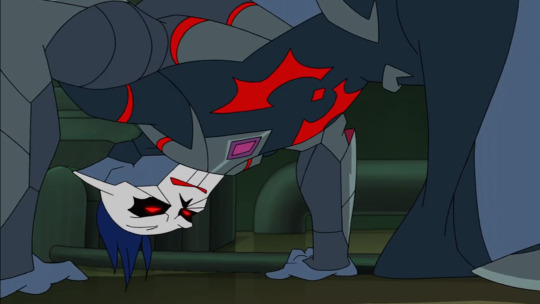
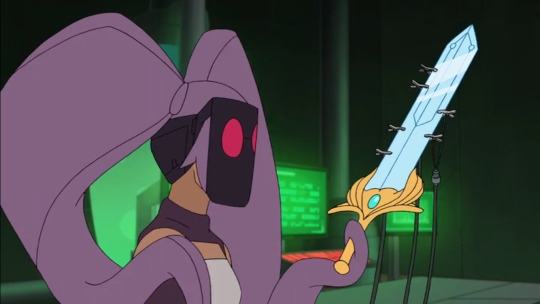
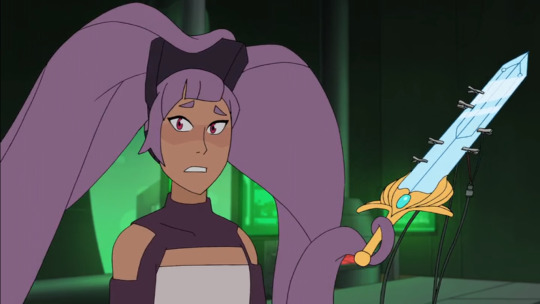
Entrapta sees him and with a worried look, drops the sword she had been puzzling over without hesitation and rushes to his side.
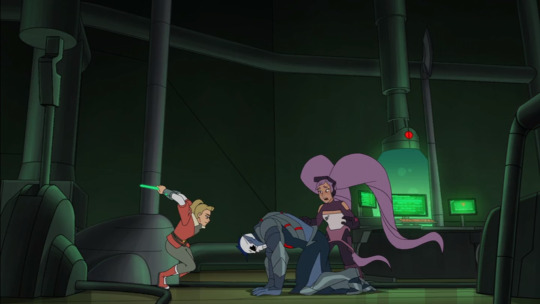
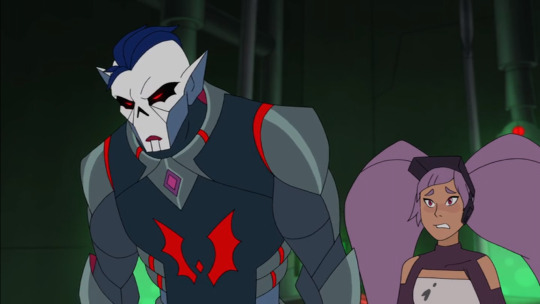
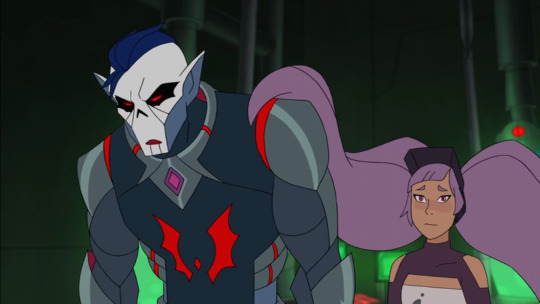
He manages to recover by himself and Entrapta tenderly touches his shoulder with her hair to give him comfort.
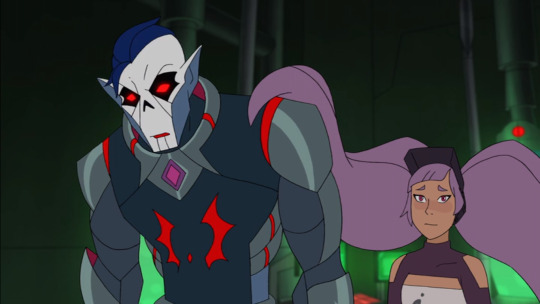
A beat later Hordak realizes what she’s doing and responds violently.
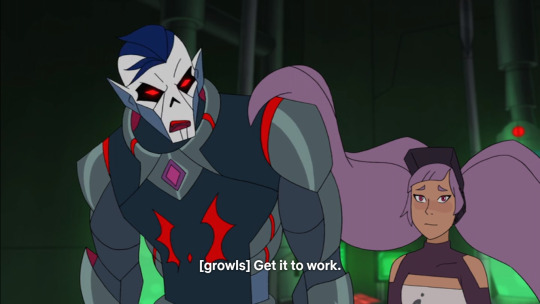
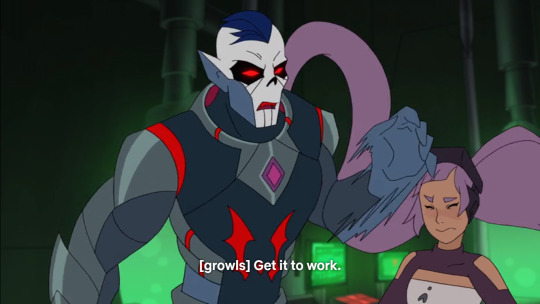
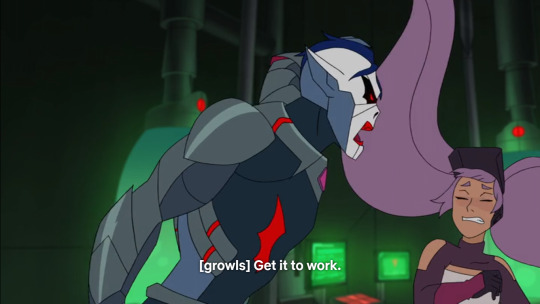
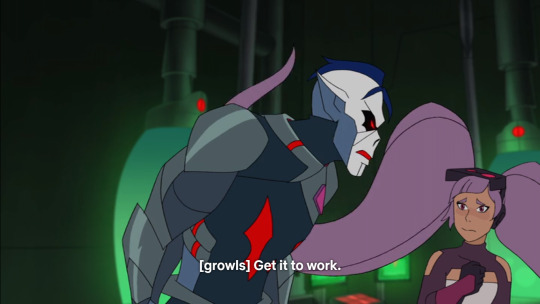
He bats her hair away from him and snaps at her before stalking away. The hurt look in Entrapta’s eyes speaks volumes.
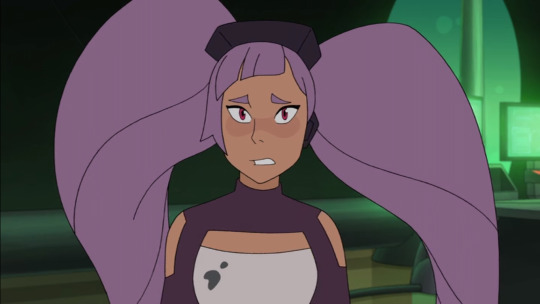
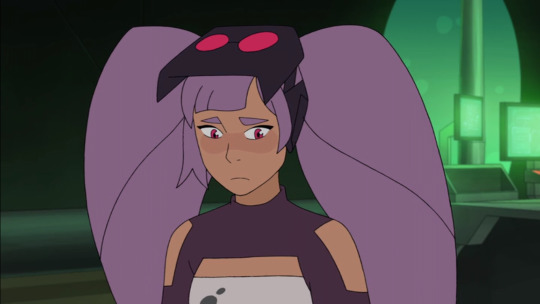
About this moment. I don’t condone how Hordak handled it, but I can sympathize. He was having a confrontation with Adora when he had his attack, right in front of her. This is a man who was very self-conscious about his illness and took pangs to hide it from his subordinates. Now it’s happened right in front of an enemy, though a prisoner, but still an enemy. He’s feeling weak at a pretty bad moment for him.
Entrapta meant well, bless her, but didn’t understand the situation from his perspective. When she comforted him, it added insult to injury and he reacted badly. Whether it was to save face, out of irritation of showing weakness, or to put Entrapta ‘back in her place’, this made their last moment together in season 3 a negative one.
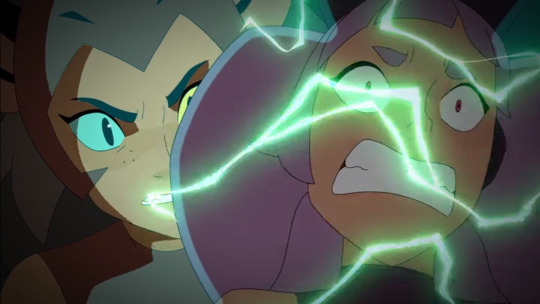
Flash forward. Adora convinces Entrapta to run more tests and Entrapta comes to the conclusion that opening the portal would be very dangerous for the planet. Her warnings to Catra fall on deaf ears and she goes to warn Hordak only to be stopped by Catra who stuns her and has her sent to Beast Island.
Sadly, we don’t see Entrapta for the rest of the season.
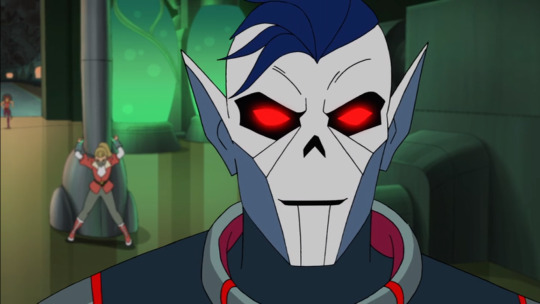
Shortly afterward, Hordak is seeing a functioning portal and is very pleased until Catra ruins the moment. She rushes in telling him the Princesses are on their way. He asks where Entrapta is because he needs her to open the portal. Catra, in one fell swoop, not only hides her treacherous actions, but also removes Entrapta as a rival as Hordak’s right hand, tells Hordak that Entrapta betrayed him.
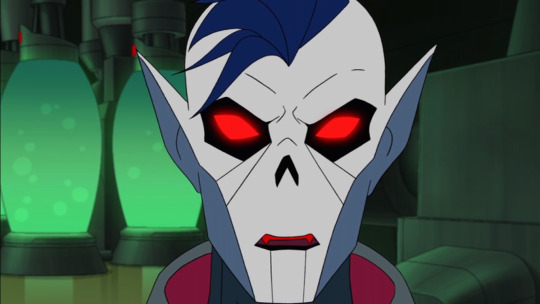
First, we see shock at the news.
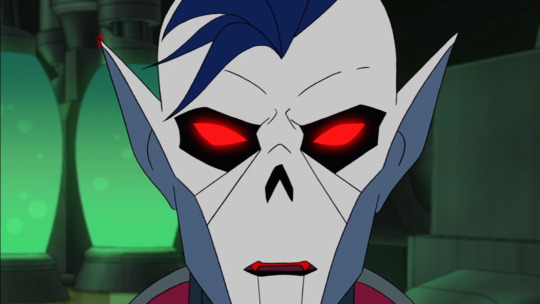
Pain.
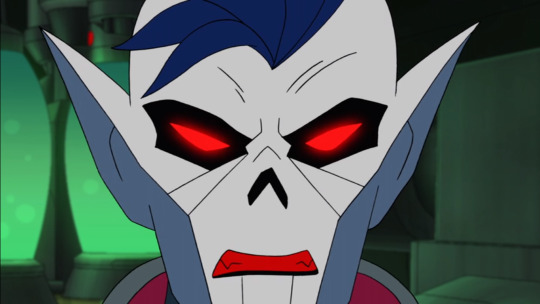
Then fury.
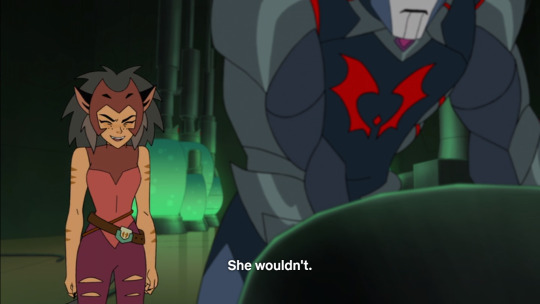
He tries to deny Catra’s words, but Catra, taking pleasure in seeing someone else being hurt assures him that it’s true.
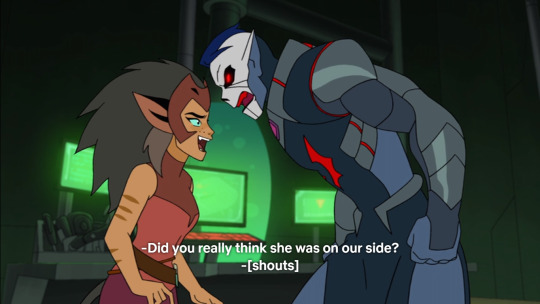
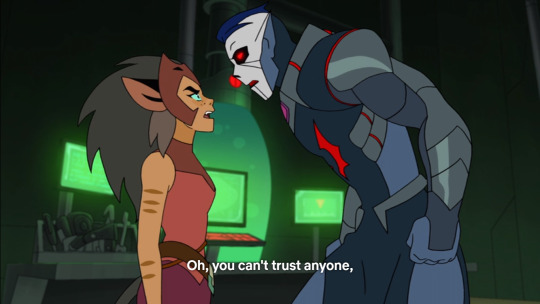
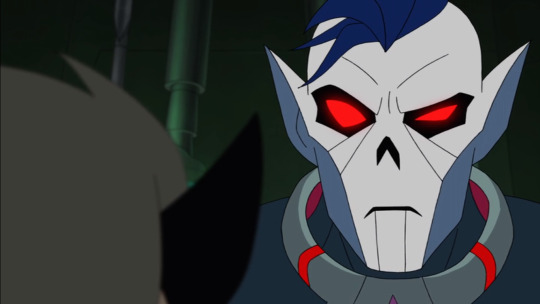
In this screen, we see Hordak look quizzically at Catra. Maybe he’s wondering why she’s so gung-ho on opening the portal, possibly more so than himself, or perhaps he’s questioning whether what she says is true or not.
I can only speculate until season 4 comes out, but I hope that Hordak will question Catra’s motivation. Or at least look into the matter further than just taking her word for it. Remember, Catra has lied to him before to cover her ass when Shadow Weaver escaped.
Later, after the portal is open and Adora destroys it, we get this last scene with Hordak.
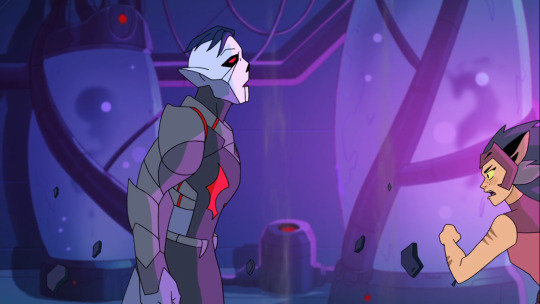
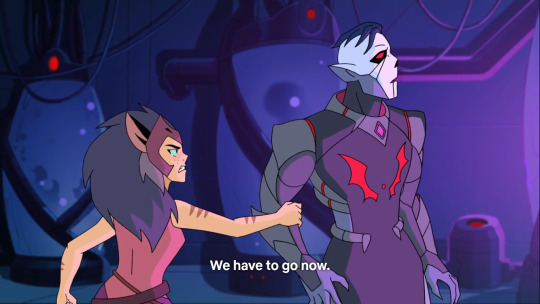
Hordak looks at the portal lost and uncertain. This should be a moment of glory for him as the finally got a portal open long enough to send a signal through. Yet, we see no happiness or triumph.
Catra has to pull him along with her to get him moving.
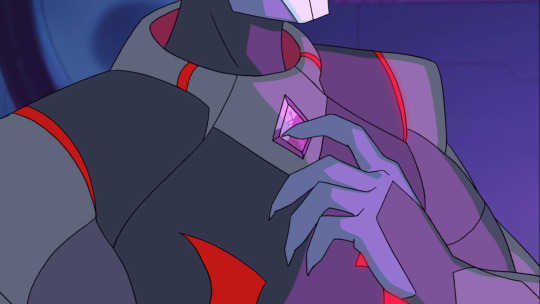
Hordak touches the stone (runestone?) at the neck of the armor Entrapta made for him.
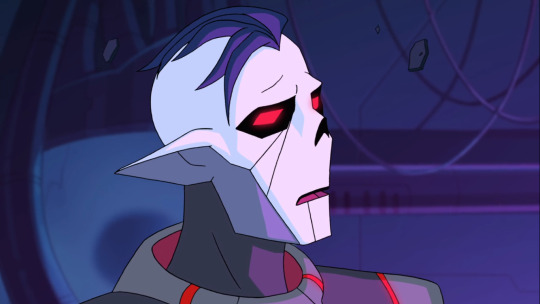
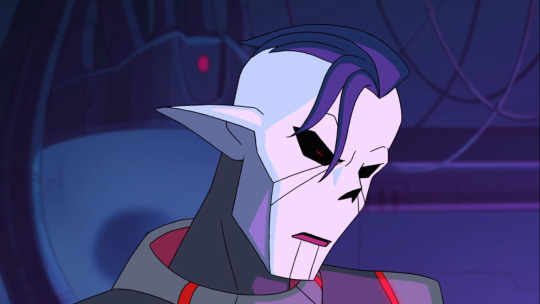
He takes a moment to reflect on Entrapta before fleeing with Catra. Even though he succeeded in what had been a lifelong goal, he thoughts goes to Entrapta.
Thus ends my take on the up and downs of Entrapdak. This pairing just seemingly came out of no where and has won over a lot of hearts.
75 notes
·
View notes
Text
The Best TV Shows of 2020
https://ift.tt/eA8V8J
Some year, eh?
We’re often poetic about TV around these parts. It’s no secret that we like to sing its praises as a powerful, restorative, and maybe sometimes therapeutic medium. But during a dangerous, confusing year, delving into the many ways that TV “kept us sane” or whatever feels reductive.
What we can say, however, is this: TV was around this year. And that’s no small feat as not every other medium was so lucky. Concerts and other live performances were canceled. The movie-going experience was upended (perhaps permanently), and even curling up with a nice book at a coffee shop was no longer an option for much of the year. The TV production schedule may have been disrupted, but for the most part, the television machine chugged along, providing us with a diverse (and often overwhelming) number of truly excellent options to take in.
This year we want to honor the best of those TV shows – not for any particular reason other than that it’s fun to do and we’ve all earned some year-end distractions. We had our staff vote on their favorite series, polled you the reader as well, then crunched all the numbers in an intensely complicated propriety equation (not really) to determine our winners.
Please enjoy our choices for the 25 Best TV Shows of 2020.
25. How To with John Wilson
How To with John Wilson is the heir to Nathan For You’s throne, which seems obvious considering the series boasts Nathan Fielder as an executive producer, but the new HBO series shares much of the fiercely beloved former Comedy Central series’ DNA. While Nathan For You used helping businesses as a jumping off point to explore social interactions and the funny, insane things that people may say or do if you point a camera in their face, How To with John Wilson purports to explain how to perform simple tasks like making small talk or splitting a check, but mostly showcases how beautiful, ugly, life-affirming, and odd life in New York City can be. It’s a difficult show to explain, but it uses dry narration and quick documentary-style footage to create laugh out loud set-ups and punchlines, and digresses into some of the most poignant, and “WTF” moments found in a comedy series. You may not learn much, but you’ll laugh a lot.
– Nick Harley
24. The Plot Against America
TV writing geniuses David Simon and Ed Burns (The Wire, The Deuce) are masters of subtlety. Their many shows, several of which are among the best in TV history, know how to conquer small moments en route to a bigger, oft devastating picture. During these very unsubtle times then, how could they possibly adapt Philip Roth’s equally unsubtle book about creeping fascism in America, The Plot Against America? The answer, as it turns out, is with the same gentle touch and keen understanding of the human condition as they always employ.
Like Roth’s 2004 novel, The Plot Against America picks up in an alternate version of the American 1940s, where real life aviation hero and Nazi-sympathizing populist Charles Lindbergh is elected president. The show then follows the working class Jewish Levin family as they deal with the fallout. Simon and Burns’ subtle touch works uncommonly well here. The Plot Against America’s six episodes are in many ways about how gradually and imperceptibly things can get worse until one’s home is no longer recognizable. For obvious reasons, the series resonated this year but its ability to summon creeping dread would have played well just about any time.
– Alec Bojalad
23. Lovecraft Country
A sprawling anthology with an overarching fable set in the depths of Jim Crow America in the 1950s, Lovecraft Country was an epic, political, sometimes gory, always ambitious sci-fi horror unlike anything else in 2020. Following the journey of Atticus (Jonathan Majors), Leti (Jurnee Smollett), and Atticus’s uncle George (Courtney B. Vance) on a mission to find Atticus’s missing father, the story combines real life racist horror with supernatural creatures inspired by H.P. Lovecraft.
Each episode is both a standalone story and part of the whole, playing with different subgenres. Ep 3 “Holy Ghost” is a classic haunted house tale with a historical twist against a backdrop of neighborhood racism, ep 5 “A Strange Case” is an extraordinary body horror which explores the female experience, 6 “Meet Me in Daegu” introduces a character from Korean folklore, while ep 8 “I Am” is a sprawling afrofuturist sci-fi. Created by Misha Green, exec produced by Jordan Peele and JJ Abrams, this is glossy cinematic stuff with a terrific ensemble cast. Talk about bang for your buck.
– Rosie Fletcher
22. His Dark Materials
If season one of this fantasy adaptation was carefully laying the tracks, then season two is hurtling along them, whooping out of the window as it goes. The new episodes started from the high-point of the season one finale and kept climbing. The difference is in tone – this time it’s warmer, keying more successfully into its characters’ emotional lives. It’s bolder too, demonstrating confidence by stepping away from the books to add scenes, humor and modern updates as required.
Season two, adapted from the second book in Philip Pullman’s original trilogy, sees Lyra and Will cross worlds and forge a bond. Will undertakes his own hero’s journey, one involving Spectres, a magical knife and the father he’d long thought dead. The real star though, is Ruth Wilson as Mrs. Coulter, a devilishly complex character into whose head this show is satisfyingly determined to get.
Season two is an episode short, thanks to COVID-19, but we should be grateful it made it here on time at all. The real delight is all the talent and effort that’s gone into telling such a weird story, one that only gets weirder from hereon in…
– Louisa Mellor
21. She-Ra and the Princesses of Power
Season 5 of She-Ra was the show at its absolute best. Every restriction seemed to be lifted and it just let loose with all the joy, deepness, and big queer energy it had ever wanted to display. Bless it for that because it allowed the show to go out on the highest of notes. We’d be here all day if we listed all the fantastic plots this season and how everyone got a chance to shine but no moment stands out more than Catra and Adora kissing.
It’s a moment queer fans had hoped for and were shocked it actually happened. Seeing two leads in a legacy property get to be not only confirmed queer but also kiss is still a rare sight and we can only hope it signals great change in animation going forward. We’re sad to see She-Ra go but glad it got to end so perfectly.
– Shamus Kelley
20. Pen15
During the 2011 “Middle School” episode of This American Life, host Ira Glass interviews producer Alex Blumberg, who presents a radical new approach to education in America: get rid of middle school. Children’s bodies and brains are just simply too volatile in their preteen years to meaningfully learn anything in the years between elementary school and high school. Give them a break, then pick up and try again in a couple years.
It’s hard not to think of that interview when watching Hulu’s wonderful middle school comedy Pen15. Lead characters Maya (Maya Erskine) and Anna (Anna Konkle) are very rarely seen learning something in class or poring over their homework. And why would they be? There are boys to obsess over, school plays to audition for, and moments that will scar them forever to experience.
Rarely has there ever been a more frank, honest, and hilarious exploration of the middle school years than Pen15. Much was made during the show’s first season about the adult Konkle and Erskine’s ability to portray their younger selves. And in season 2, they blend in so seamlessly that the novelty of the casting choice might never even occur to the viewer.
– Alec Bojalad
19. I Hate Suzie
The last time playwright Lucy Prebble wrote a TV series for Billie Piper, it was 2007’s Secret Diary of a Call Girl. London-set, glamorous, sexy and funny, that was a distinctly twentysomething story. Over a decade later, Prebble and Piper reunited to do something different in I Hate Suzie; still funny, but rawer, more experimental, and probing all the ways that a thirtysomething woman’s identity – wife, mother, and in this case, celebrity – can be defined by everything except herself.
Piper plays popstar-turned actor Suzie, whose life explodes when hacked photos of her cheating on her husband leak online. Suzie goes through the stages of grief in eight riotous half-hour episodes that experiment with form and genre. There’s drama. There’s satire. There’s singing and dancing. There’s Dexter Fletcher doing coke off a bare arse, and a whole-episode wank that explores the societal construction of female desire. It is, in modern parlance, a lot, in the most exhilarating and enriching way. These two had better not leave it another 10 years until their next collaboration. We demand more.
– Louisa Mellor
18. Rick and Morty
Did you hear? This guy turns himself into a pickle…a PICKLE! It’s wild. Every subsequent year that Rick and Morty airs, it gets harder to separate the “meme” of Rick and Morty from the show itself. Suppose that’s just what happens when a fanbase proves itself to be…uh, energetic, and the Merchandising Industrial Complex kicks itself into overdrive to produce some truly offensively bad Big Dog-style shirts.
Removed from the meta of it all, Rick and Morty still churned out some great episodes of television in 2020. The back half of the series’ two-part season 4 all aired this year and there were real gems included among them. Though it proved to be divisive, “Never Ricking Morty” was certainly among the most structurally ambitious installments the show has ever attempted. Then there was just the sublimely hilarious “The Vat of Acid Episode,” which was enough to earn the show a Best Animated Series Emmy.
– Alec Bojalad
17. Dark
Dark is already notable for reaching levels of popularity in the United States not often enjoyed by subtitled fare, but it also was afforded the rare opportunity to end on its own terms with its third season in 2020. Audiences fell in love with the generational stories of the families living around the nuclear power plant in Winden, Germany, marveling at casting choices for characters in their older or younger forms whose resemblances were spot on.
The time travel plot tied viewers’ brains into knots, but the desire to see an end to the apocalypse was made even deeper by the strong chemistry between Dark’s own Adam and Eve: Jonas and Martha. As the true source of the alternate timelines and causal loops became known, everything about the show’s reality was called into question, but the ending left a lingering question mark to entice fans to speculate long after the show had ended.
– Michael Ahr
16. The Untamed
While The Untamed technically premiered in 2019, the Chinese xianxia drama was one of the escapist stories that most defined a year we all wanted to get as far away from as possible. Bursting onto the transformative fandom scene to come in ninth on Tumblr’s list of the most-discussed live action TV shows of 2020, the foreign-language fantasy series tells the story of supernatural flautist Wei Wuixan (Xiao Zhan) from his humble beginnings as a teen cultivator-in-training to his controversial role as a demonic cultivator war hero to his time as a masked detective after he is mysteriously brought back to life in a stranger’s body 13 years after his gruesome death.
But, like any good melodrama, The Untamed is really all about the relationships. This is a complex emotional story about siblings and sects, honor and morality. At the heart of the interpersonal narrative is the epic romance between Wei Wuixan and his stoic swordsman boyfriend Lan Wangji (Wang Yibo). The Untamed is adapted from an explicitly queer web novel, but China’s anti-LGBTQ censorship laws require the series tell its love story via lingering gazes, clasped wrists, and declarations of undying devotion. The result is no less queer, as these canonical soulmates sacrifice everything but their fervid commitment to protect the innocent for one another.
– Kayti Burt
15. The Haunting of Bly Manor
In 2018, Netflix shrieked its way into the spooky season game with the breakout hit The Haunting of Hill House. The streamer then afforded creator Mike Flanagan the opportunity to American Horror Story-ize his work into an anthology of his own, thus The Haunting series was born. In typical second child fashion, The Haunting of Bly Manor had a world of expectations to live up to, which included its often-adapted source material, primarily the novella Turn of The Screw by Henry James (or Hank Jim as we like to call him) among two other works. Flanagan, who’s a heavyweight in the horror genre at this point, again eschewed a direct remake for a loose adaptation with Bly Manor, a slow burn, but ultimately a deeply personal and satisfying tale of ghosts, both of the faced and faceless variety, intertwined with Gothic romance.
The returning players from the previous season, Victoria Pedretti (Dani), Oliver Jackson-Cohen (Peter Quint), Henry Thomas (Henry Wingrave), Carla Gugino (The Storyteller), and Kate Siegel (a surprise character in an excellent episode 8), bring back some of the winning chemistry from Hill House. However it’s the newcomers to the series, T’Nia Miller as Hannah Grose the housekeeper, Amelia Eve as Jamie the gardener, and Rahul Kohli as Owen the cook, whose standout performances ground Flanagan’s headier concepts, like the series’ mesmerizing fifth episode. It’s through these characters that Bly Manor poignantly articulates how love can be as much of a burden as it is a blessing. Not long after your Bly Manor binge is complete, Flora’s line, “You said it was a ghost story. It isn’t. It’s a love story,” will crystallize the throughline Flanagan was gunning for. And if that line isn’t a lasting memory of the limited series, perhaps it’s Owen’s lucious mustache, the best on TV in 2020, that will live on.
– Chris Longo
14. Ted Lasso
In a relentlessly dark year, Ted Lasso was one of the few rays of sunshine that warmed our hearts. Its title character is so pleasant and optimistic, he makes Leslie Knope look like a curmudgeon by comparison. Folksy, thoughtful, and almost aggressively friendly, Jason Sudeikis’s Lasso is hired to lead a struggling English Premier League team in a move of sabotage, but ends up charming the pants off of the squad and proving the power of positivity.
The character is practically impossible not to like, and in a time of so much anxiety and frustration, it’s refreshing to spend time with someone like Ted. The title coach isn’t the only reason to watch; the show features well-crafted characters with satisfying individual arcs, comforting, yet well-executed sports movie tropes, and funny fish out of water culture clash moments. Ted Lasso is a breezy, low-effort experience that makes you feel good. What more could you ask for in 2020?
– Nick Harley
13. The Umbrella Academy
The first season of The Umbrella Academy was already a stellar achievement in adapting the gloriously weird Gerard Way/Gabriel Bá graphic novels, but season 2 took the show to another level in 2020. The varied reactions of the superpowered family to being stranded in 1960s Dallas were extremely enlightening and made the characters even more enjoyable with all of their quirks, flaws, and emotional depth.
Of particular interest was the manner in which Allison strove to lead a normal life with a husband that loved her despite the difficulties of being Black in the segregated South and her determination not to use her powers. Fan favorite character Ben also received a noble and inspiring arc that led to a completely new role for him in season 3. Although there are plenty of mysteries remaining, the unfolding backstory leaves us always wanting more of The Umbrella Academy.
– Michael Ahr
12. The Great
“Russia must be saved, and I with it.” An occasionally true story from The Favourite co-screenwriter Tony McNamara, The Great is a satirical look at the rise of Russian monarch Catherine the Great (Elle Fanning, getting a chance to show off her comedic chops), from her arrival from Prussia as a naive teen bride to her time plotting the death of her husband, Emperor Peter III (Nicholas Hoult, seemingly having the time of his career). The Great is cutting, clever, and hilarious, but, like The Favourite before it, its true secret weapon lies in its moments of earnest emotion.
The Hulu series revels in the often absurd nature of its subject matter, but not at the cost of ignoring the trauma and joys of its often gruesome world. The unpredictability of which kind of scene you will get next—absurd, deeply emotional, or both—creates a fantastic dramatic tension that sustains throughout the entire 10-episode first season, perhaps necessary in a story that, should it follow the broadest of historical strokes, the viewer knows will end in Catherine’s triumph. Huzzah!
– Kayti Burt
11. Harley Quinn
This year, we found out the answer to a question that no one was really asking – “who would win: a big budget Birds of Prey DC spinoff movie starring Margot Robbie as Harley Quinn, or one small Harley Quinn-focused animated series that was seemingly about to be left for dead on the ailing DC Universe streaming service?” Harley Quinn won, for everyone who cared to investigate, as the show leveled up in season 2 by having the balls to let Dr. Harleen Frances Quinzel fall in love with her sardonic roommate Poison Ivy on screen and ditch any lingering feelings she had for the Joker, but for those not invested in the romance (they should go have a soup and rethink their priorities) there was so much else going on beyond deconstructing its central character.
Animated shows are typically seen as an immature, lesser form of entertainment than live-action series, but just imagining the creativity you’d need to come up with this many running jokes, in-jokes and meta jokes for the larger-than-life characters of Gotham is exhausting. There’s so much writing talent behind Harley Quinn that a third season wasn’t just expected, but demanded. And indeed, Harley Quinn will live on at HBO Max, but if it hadn’t happened, we’d do what the Doctor ordered and RIOT.
– Kirsten Howard
10. BoJack Horseman
Through its superb six-season run, BoJack Horseman’s tonal brilliance came to be an expected fact of life. Early on, it was tempting to pull non-viewers aside, shake their shoulders, and yell in their face “No, you don’t get it! It’s an animated comedy about a horse that was a ‘90s sitcom, yes, but it’s also a searing exploration of depression, dysfunction, and the dismal nature of the human condition!” It’s to the show’s eternal credit that that stellar comedic/dramatic tightrope act became all but a given a few seasons in and the world adjusted to it thusly. But even with that level of familiarity and comfort, it’s jarring just how well the show pulls off that delicate formula in its final, and perhaps best season.
BoJack Horseman season 6 premiered eight of its final 16 episodes in 2020’s first month and their dramatic resonance carried through the rest of the year. The story ends here as we always expected it might. BoJack’s past finally catches up to him, and when he becomes a pop culture pariah, he slowly begins to undo whatever progress he made throughout the series, culminating in a stunning penultimate episode where BoJack faces the infinite and meets up with all the figures in his life who died along the way. But it’s not until the show’s very end where the message comes into clear focus. BoJack has to start all over again, just like we all must from time to time. The difference this time is that the other people in his life are finally prepared to move on…possibly without him. “Hey, wouldn’t it be funny if this night was the last time we ever talked to each other?” BoJack says to Diane as they look up at the Hollywood night sky. Wouldn’t it be funny indeed.
– Alec Bojalad
9. Legends of Tomorrow
There is no superhero TV show that has strayed as far from its superheroic roots than Legends of Tomorrow. Despite the fact that its full official title is quick to point out that this is indeed DC’s Legends of Tomorrow, you’d be hard pressed to find a DC show less overtly concerned about its comic book roots, or even with any synergistic responsibilities it may have to the other DC shows in its orbit. Sure, Supergirl, Black Lightning, The Flash, and Stargirl are great, and they’re note perfect representations of what makes those characters special, but Legends does everything those other shows do, but with far less recognizable characters, with far more laughs, and an effortlessly perfect ensemble cast boasting chemistry for days.
No matter how high the reality-altering stakes, it all seems less important than watching the friendships between this crew of superheroic time traveling misfits. Legends of Tomorrow is everything good and hopeful and pure (ok, well…maybe not pure, especially where Matt Ryan’s John Constantine is concerned) about superhero shows without any of the baggage, and often without the superheroics. Always hilarious and often surprisingly touching, there’s not a single superhero team on the big or small screen that you’d rather actually hang out with. You don’t have to love superhero TV to love Legends, you just have to love TV.
– Mike Cecchini
8. Schitt’s Creek
People who love Schitt’s Creek LOVE Schitt’s Creek. It’s almost become cult-like in its following, so the arrival of the sixth and final season felt like an event and the end of a journey not just for fans of the show but the stars themselves. Season six isn’t the best season of Schitt’s – it leans into the schmaltz and sentiment heavily and throws realism to the wind in favor of the absurd but if you’ve come this far with the displaced Rose family and the sometimes odd but overall endearing residents of Schitt’s Creek, you won’t be disappointed.
All the major players get their arc. Alexis and Ted’s separation is heartbreaking, Moira’s Crows movie premiere is a hilarious mess, some of the Jazzagals almost join a cult… the season is packed with ridiculous scenarios in between many more moments of genuine sweetness as it gently guides its characters to an end. The finale comes together with David’s wedding to Patrick – a perfectly idiosyncratic affair in the Schitt’s Creek town hall. It’s a moving send off to which we’re all invited.
This is a show about family and community, created by a real family – father and son Eugene and Daniel Levy (sister Sarah plays Twyla) – that spawned a community of fans. This might be the end of Schitt’s Creek but we can always re-visit.
– Rosie Fletcher
7. Devs
Alex Garland’s unsettling, yet visually gorgeous science-fiction parables are always thought-provoking, but FX’s Devs asks bigger questions than any of the writer/directors previous projects. Do we determine our own fates? Does the multiverse exist? Can computers predict our future? Devs isn’t just heady techno-philosophical musings, it spends its runtime being a pretty satisfying corporate thriller, with our protagonist Lily (Sonoya Mizuno) investigating the mysterious disappearance of her boyfriend.
This is a somewhat scathing indictment on Silicon Valley culture, with a Google-esque tech company operating with unmatched power in the shadows. Featuring a moving dramatic performance from Nick Offerman and a star-making turn from Sonoya Mizuno, Devs is just as pretty, existentially threatening, and hard sci-fi as Garland’s beloved films Ex Machina and Annihilation. If you love thrillers, but are also interested in Quantum Theory, this was the limited series you’d been waiting for in 2020.
– Nick Harley
6. The Mandalorian (READERS’ CHOICE)
Starting with its first season and extending into its improved second, The Mandalorian just works. Jon Favreau and Dave Filoni’s creation about the galaxy’s most beloved bounty hunter dad is the kind of forward-thinking Star Wars project that works perfectly on a streaming platform.
If you’re a massive Star Wars nerd, The Mandalorian continues to provide plenty of Easter eggs and callbacks for you, but the show excels at being both a fun reentry point for fans fatigued with the sequels and prequels, and a standalone adventure series for viewers who don’t have much knowledge of Star Wars at all, deftly creating a string of sidequests in a galaxy far, far away that put you firmly in the beautiful Lone Wolf and Cub-like tale of Mando and Grogu as they fly toward an unknown future.
As we recently learned, there will come a time in the next few years when we will be simply drowning in Star Wars TV series, as ten(!) of them are in development, but for now, we get to really savor the intricate worldbuilding going on in The Mandalorian.
This is the way.
– Kirsten Howard
5. The Boys
The Boys was a breakout hit when it first landed on Amazon’s streaming service, but when the series returned, there was a bit of a backlash from fans of the show who were enraged that some of its new episodes would arrive weekly, unlike the binge-ready first season. Luckily, Season 2 had so many “what the fuck” moments in store that the griping soon quietened down, and the show eventually found its stride again after a slow start. Our diabolical, supe-fighting team led by a rather distracted Billy Butcher dealt with one bonkers revelation about Vought International after another this season, while the Supes themselves battled with their own humanity, and both groups often found common ground where they least expected it.
It’s really hard to pick a favorite moment from Season 2, but if you’ve forgotten how out there it was, let us present a wild bouquet that includes “Homelander angrily wanking over the city in the form of his own demented Bat-Signal”, “The Seven filming a very (very) thinly-veiled Zack Snyder-esque superhero movie that had undergone a Joss Whedon rewrite”, “a massive-dicked supe-in-captivity called Love Sausage”, and “a timid child getting confidently pushed off the roof of a house by his own beaming father”. And that’s without bringing up the whole “immortal Nazi” stuff that occasionally propelled the narrative into Verhoeven-level satirical territory.
There were things that didnt work about Season 2, and we can argue about them forever, but there’s one thing that everyone can agree on: if Antony Starr doesn’t get two armfuls of awards for his performance as Homelander, a fucking travesty has occurred.
– Kirsten Howard
4. I May Destroy You
On a night out while writing the second series of her acclaimed sitcom Chewing Gum, Michaela Coel was drugged and sexually assaulted by strangers. What she did with that experience – alchemizing it into a wise and fearless TV drama about trauma and survival – was extraordinary.
I May Destroy You is an extraordinary series. In it, Coel plays Arabella, a young writer also drugged and raped on a night out, while under pressure from publishers to follow up her hit book debut. With long-ranging flashbacks, the story moves through the next year in Bella’s life. We see her draw power from her new identity as a survivor and (often clumsily) navigate close friendships and new sexual relationships. She strays from likeability, changing in response to what happened, and in a transcendent, experimental finale, teaches herself how to live.
Coel is a bewitching lead with excellent support from Weruche Opia and Paapa Essiedu as Bella’s friends Terry and Kwame. This is no dreary misery memoir. It’s surprising, confrontational, often funny and always buzzing with life – a frank and much needed course correction for telling this kind of story on screen.
– Louisa Mellor
3. What We Do in the Shadows
Over the past decade of television, we’ve come to expect a lot out of our TV comedies. Since the Emmy Awards now categorize just about anything that’s 30 minutes long as comedy, the genre is now home to things like shockingly dramatic coming of age tales, intensely personal narratives, and experimental structures. This evolving of the half hour format is a welcome one. At the same time, however, sometimes you just want to laugh.
Enter What We Do in the Shadows. In its remarkable 10-episode second season, this FX adaptation of Jemaine Clement and Taika Waititi’s movie of the same name made a serious case for itself as the funniest show on television. And it did so in shockingly simple fashion. In season 2, the character list remains short: just Nandor (Kayvan Novak), Laszlo (Matt Berry), Nadja (Natasia Demetriou), Guillermo (Harvey Guillen), and Colin Robinson (Mark Proksch) make up the show’s cast of characters for the most part (give or take a Mark Hamill or Nick Kroll). And that’s all they need.
This year, the writers and performers all operate at the top of their game to make every possible plotline work and every character pairing sing. The comedic energy is top notch from the season’s opening “Resurrection” episode through midseason classics “Colin’s Promotion” and “On The Run” and all the way to the finale “Nouveau Théâtre des Vampires.”
– Alec Bojalad
2. Better Call Saul
The penultimate season of Better Call Saul was an absolutely brilliant run of episodes that perfectly set the stage for a climactic conclusion that looks to be every bit as heart-wrenching and explosive as the final season of parent series Breaking Bad. The show successfully introduced Lalo, perhaps the most charismatic and terrifying villain in Vince Gilligan’s Albuquerque, and merged the series’ seemingly disparate storylines by bringing fan-favorite Kim Wexler closer to the dangerous dealings of the cartel.
It turns out that Jimmy becoming Saul wasn’t the tragedy that we should have been anticipating, it was Kim embracing the Saul way that we should have been worried about. The show’s strengths have always been its meticulous attention to details, fascination with processes, and humanistic view of exactly why someone like Jimmy McGill might break bad and become a dishonorable huckster like Saul Goodman. Those strengths only became more apparent in the thrilling, low-key heartbreaking fifth season.
– Nick Harley
1. The Queen’s Gambit
Oftentimes when assessing the quality of TV shows, we talk about how “timely” they are. In fact, if you scroll back through this list, you will find at least a few instances of just such language. The appeal to Netflix’s stylish, thrilling limited series The Queen’s Gambit, however, is just how timeless it is. And in a year with plenty of timely TV shows, that distinction was enough to launch the show to the very top of our best-of list.
Though we on the television side of Den of Geek are loath to call any rightful TV show an “x-hour movie,” there’s no denying that The Queen’s Gambit fits that mold. But this is not just any kind of filmic experience. It’s a throwback to a ‘70s and ‘80s style of simple, elemental storytelling that simply knows how to win over an audience. The beats of The Queen’s Gambit are predictable, but elegant and perfectly executed. Beth Harmon (the ethereal Anya Taylor-Joy) is a quiet, wide-eyed hero armed with one skill that can make the world care about her and in turn make her care about herself.
So she uses that skill and assembles her tools – her King, Queen, Bishops, Knights, Rooks, and Pawns, to embark on a classical bildungsroman journey of self-discovery and chess dominance. Like a deftly executed chess game itself, each of The Queen’s Gambit’s seven episodes acts like a move on a chess board. Some moments are triumphs, some are defeats, and some are sacrifices. But they all lead into one definitive, enormously satisfying checkmate.
– Alec Bojalad
cnx.cmd.push(function() { cnx({ playerId: "106e33c0-3911-473c-b599-b1426db57530", }).render("0270c398a82f44f49c23c16122516796"); });
Other shows receiving votes: Animaniacs, Ozark, High Fidelity, Star Trek: Picard, The Last Dance, Mrs. America, Solar Opposites, The Hollow, Killing Eve, Noughts + Crosses, Outlander, Star Trek: Discovery, Vida, Saved by the Bell, Lucifer, Gangs of London, Mythic Quest: Raven’s Banquet, World on Fire, Crash Landing on You, Infinity Train, Locke & Key, McDonalds & Dobbs, Into the Night, The Good Lord Bird, The Last Kingdom, DuckTales, Little Fires Everywhere, Normal People, Brooklyn Nine-Nine, The Pharmacist, Doctor Who, Away, Dublin Murders, Great Pretender, The Babysitters Club, Tiger King, The Crown, Ramy, The Shivering Truth, Perry Mason, Keep Your Hands Off Eizouken!, The Undoing, Westworld, Doom Patrol, Stargirl, The Clone Wars, P-Valley, Bridgerton, Homeland, Stumptown, The Magicians, Bob’s Burgers, Primal, Jurassic World: Camp Cretaceous, Zoey’s Extraordinary Playlist, Search Party, Roadkill, Raised by Wolves, The Flight Attendant, The Eric Andre Show, Defending Jacob, The Outsider, Julie and the Phantoms, Brave New World, Utopia, Carmen Sandiego, Brockmire, Somebody Feed Phil, Adventure Time: Distant Lands, Dead to Me, The Gift, Ghosts, YOLO: Crystal Fantasy, The 100, The Spanish Princess, I’ll Be Gone in the Dark, Adult Material, Fargo, Deadwater Fell, The Flash, Archer, Weird But True, Evil, Motherland: Fort Salem, Baghdad Central
The post The Best TV Shows of 2020 appeared first on Den of Geek.
from Den of Geek https://ift.tt/3oUilhV
0 notes